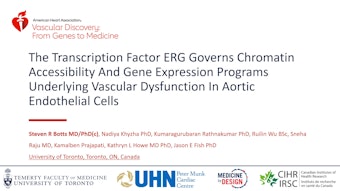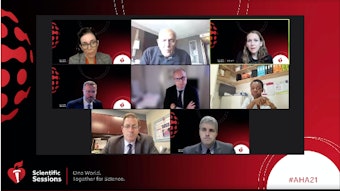Daniel J. Rader, MD, to receive AHA’s 2021 Research Achievement Award
The Research Achievement Award is the association’s highest scientific award, given each year in recognition of outstanding lifetime contributions to cardiovascular research and/or teaching.

Daniel J. Rader, MD, FAHA, of the Perelman School of Medicine at the University of Pennsylvania, was named the recipient of the 2021 Research Achievement Award.
The Research Achievement Award is the association’s highest scientific award, given each year in recognition of outstanding lifetime contributions to cardiovascular research and/or teaching. Dr. Rader’s outstanding lifetime contributions to basic and translational research in the genetics and pathophysiology of lipid disorders have advanced our understanding of the molecular regulation of lipoprotein metabolism and the development of therapies for dyslipidemia. His research has used genetics and physiology in humans and focused on novel pathways regulating lipid and lipoprotein metabolism and atherosclerosis using genetics, and factors regulating the structure and function of high-density lipoproteins and reverse cholesterol transport.
Dr. Rader uses a variety of translational approaches to ensure human and clinical relevance to prevent cardiovascular disease. His lab at the Perelman School of Medicine at the University of Pennsylvania integrates “big human data science,” targeted deep phenotyping in selected human subjects, and fundamental, mechanistic investigation in model systems to ensure bidirectional translation of research insights. Dr. Rader has broad expertise across these diverse domains, and he is one of only a few scientists who has integrated these domains to accelerate discovery. During his outstanding career, he has mapped genetic loci and then utilized functional genomics to learn more about the biologic components of these loci to increase understanding of the molecular architecture associated with metabolic traits. As a translational accomplishment, he rescued and developed a microsomal transfer protein inhibitor that received FDA approval for use in patients with homozygous familial hypercholesterolemia.
“I’m tremendously honored to be recognized by the AHA with the 2021 Research Achievement Award,” said Dr. Rader. “I have committed my career to research, investigating the fundamental basis of lipid disorders and atherosclerotic cardiovascular disease and translating that information into how we can manage and prevent these conditions more effectively. Ensuring that knowledge gleaned from research is used to develop new approaches to unmet medical needs provides scientists like me great incentive, hoping to continue improving patient care and patient outcomes. The greatest achievement in medicine is to contribute to our constantly evolving understanding of the complexities of human health and disease. I’m proud of my research contributions to not only science but also to cardiovascular care and prevention.”
Dr. Rader, trained and board certified in internal medicine, is the Seymour Gray Professor of Molecular Medicine, chair of the department of genetics, and chief of the division of translational medicine and human genetics in the department of medicine at the Perelman School of Medicine of the University of Pennsylvania in Philadelphia. Dr. Rader directs the Penn Medicine BioBank and serves as associate director of the Institute of Translational Medicine the Therapeutics at Penn, as well as the chief of the division of human genetics at the Children’s Hospital of Philadelphia.
Dr. Rader earned his medical degree from the Medical College of Pennsylvania. He completed his internship and residency in internal medicine at Yale-New Haven Hospital, and his fellowship at the Molecular Disease Branch of the National Heart, Lung, and Blood Institute of the National Institutes of Health, where he also served as a staff scientist in the Molecular Disease Branch until 1993. He joined the University of Pennsylvania in 1994 as an assistant professor in medicine.
Dr. Rader has authored more than 600 research papers published in peer-reviewed journals. Dr. Rader has been honored by the association twice before — in 2000 as an Established Investigator awardee and in 2012 with the Clinical Research Prize in recognition of his work to develop new methods of identifying factors that regulate fat metabolism within the bloodstream and testing its impact on the development of atherosclerosis.











